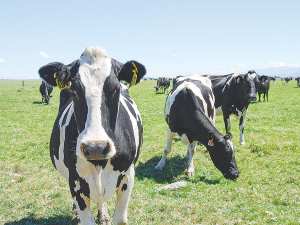LIC lifts half-year revenue on strong demand for dairy genetics
Herd improvement company LIC has posted a 5.2% lift in half-year revenue, thanks to increasing demand for genetics.
 17% of the national herd of 4 million cows did not get pregnant and won’t be producing milk in the coming season.
17% of the national herd of 4 million cows did not get pregnant and won’t be producing milk in the coming season.
OPINION: News that about 17% of the national herd of 4 million cows did not get pregnant and won't be producing milk in the coming season will come as a blow to many farmers and the economy of the country.
While the statistics from LIC are 'interim', the reality is the final figure when they do come out will differ little. It will add to a list of challenges already confronting the industry. Fonterra lowered its 2022-23 forecast farmgate milk price by 20c this month, inflation is still rising, as are interest rates, and labour supply and input costs are still an issue.
Arguably farmers should have seen this fertility drop coming and some did, spending extra cash to get their cows in perfect condition for spring mating.
The weather was unquestionably a problem and many farmers took the risk of milking late into last seaon. For some, this hasn't paid off. It was a tough winter and a late spring and balance days were over a week later than normal. In many cases, grass was low in ME.
But the stark reality which has emerged is that, on average, the reproduction performance of the national herd has dropped significantly. This was flagged in late spring when LIC noted that the submission rate for cows was down by 1.3%. It may not sound much in percentage terms, but the consequences of this will impact on both the meat and dairy sectors, which are intertwined.
If 40,000 plus extra cull cows become destined for the works, can the processors who are already hort of labour cope? Will this flood of cull cows impact on the beef schedule and how will that play out in export returns to New Zealand?
The international meat market is already in a fragile state and the operatins and marketing staff in the meat companies will be scratching their heads to find a way to deal with this challenge.
One could argue that some of the problem was due to farmer fatigue and the lack of quality labour - something incidentally that has affected returns in other primary sectors.
What it does show is that farmers can't afford to drop their game at any time, regardless of their situation.
Dairy Women's Network (DWN) has announced that Taranaki dairy farmer Nicola Bryant will join its Trust Board as an Associate Trustee.
Rural Women New Zealand (RWNZ) says it welcomes the release of a new report into pay equity.
Red meat exports to key quota markets enjoyed $1.4 billion in tariff savings in the 2024-25 financial year.
Remediation NZ (RNZ) has been fined more than $71,000 for discharging offensive odours described by neighbours as smelling like ‘faecal and pig effluent’ from its compositing site near Uruti in North Taranaki.
Two kiwifruit orchards in the Bay of Plenty and one in Northland are this year's finalists for the Ahuwhenua Trophy competition.
OPINION: Staying with politics, with less than nine months to go before the general elections, there’s confusion in the Labour…
OPINION: Winston Peters' tirade against the free trade deal stitched with India may not be all political posturing by the…